Is remote work at high levels here to stay? My guess has been that it isn't, though obviously it was a previously growing trend that was bound to get a tailwind from the pandemic.
It's still too early to draw any firm conclusions, but I figured it was time to mark my views to market and take a look at where we are now—or try to, anyway, since this is no easy task. First up, here's my best estimate of the percentage of workers who primarily work remotely:
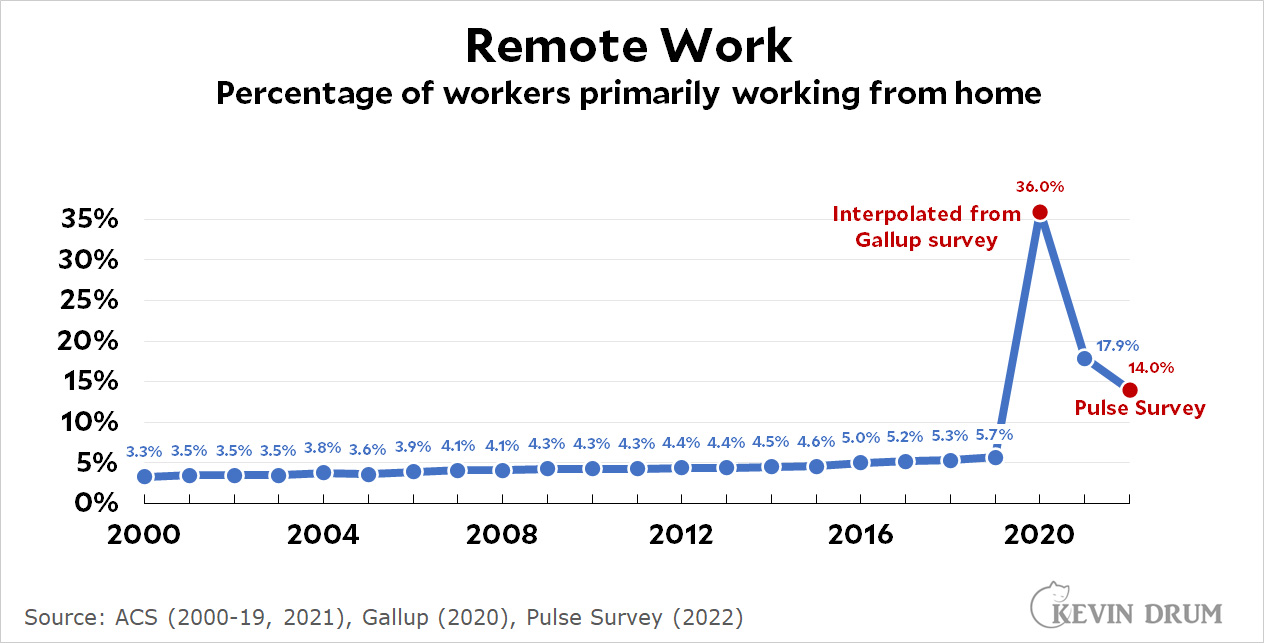 This is very rough since no one was much interested in this question before the pandemic and data has been spotty during and after the pandemic. Question wording is also critical. Most of this data is from the Census Bureau's American Community Survey (here and here), where it's extrapolated from commuting rates. But there was no ACS in 2020, so I interpolated a Gallup poll which suggested twice as many people worked from home in 2020 compared to 2021. Finally, for 2022, I used the latest Pulse Household Survey from the Census Bureau, which asks directly about working from home.
This is very rough since no one was much interested in this question before the pandemic and data has been spotty during and after the pandemic. Question wording is also critical. Most of this data is from the Census Bureau's American Community Survey (here and here), where it's extrapolated from commuting rates. But there was no ACS in 2020, so I interpolated a Gallup poll which suggested twice as many people worked from home in 2020 compared to 2021. Finally, for 2022, I used the latest Pulse Household Survey from the Census Bureau, which asks directly about working from home.
This is obviously complicated and possibly wrong since these numbers aren't entirely comparable, but I think they're about as close to accurate as we can get at the moment.
As the chart shows, working remotely has come down a lot since its pandemic peak, mostly for obvious reasons. But there's also this from LinkedIn:
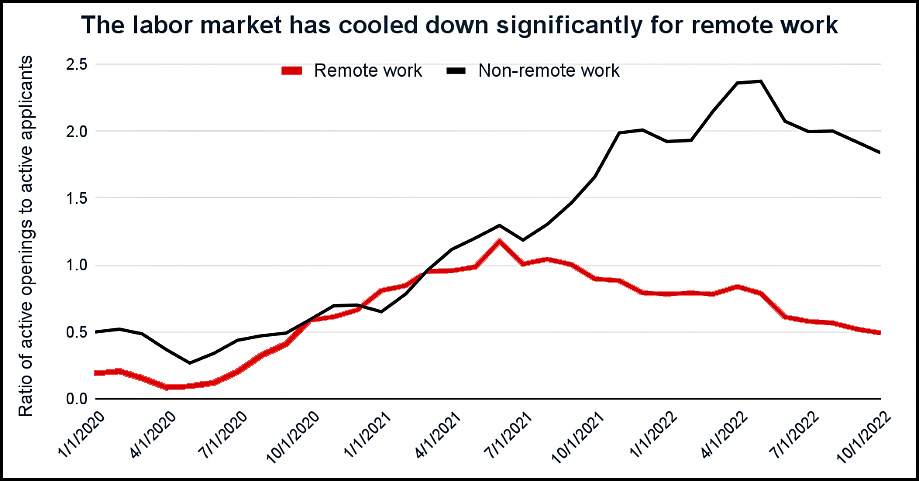 This chart suggests that aside from the slowdown in COVID, the decline in remote work is largely due to employers getting tired of it. If you invert the chart data you get the number of applications per open job, which until mid-2021 was about the same for remote and non-remote jobs. Since then things have diverged dramatically: employers get a lot more applications for remote work (two for every job) than for each non-remote job (half an application per job). This tells us that workers remain eager for remote jobs, but it turns out that employers have decreased the number of remote jobs they offer anyway (from 17% of all job openings at the start of the year to 14% today). Employers want their workers in the office.
This chart suggests that aside from the slowdown in COVID, the decline in remote work is largely due to employers getting tired of it. If you invert the chart data you get the number of applications per open job, which until mid-2021 was about the same for remote and non-remote jobs. Since then things have diverged dramatically: employers get a lot more applications for remote work (two for every job) than for each non-remote job (half an application per job). This tells us that workers remain eager for remote jobs, but it turns out that employers have decreased the number of remote jobs they offer anyway (from 17% of all job openings at the start of the year to 14% today). Employers want their workers in the office.
Next up is another marker of working in an office rather than from home. It's the vacancy rate of office space:
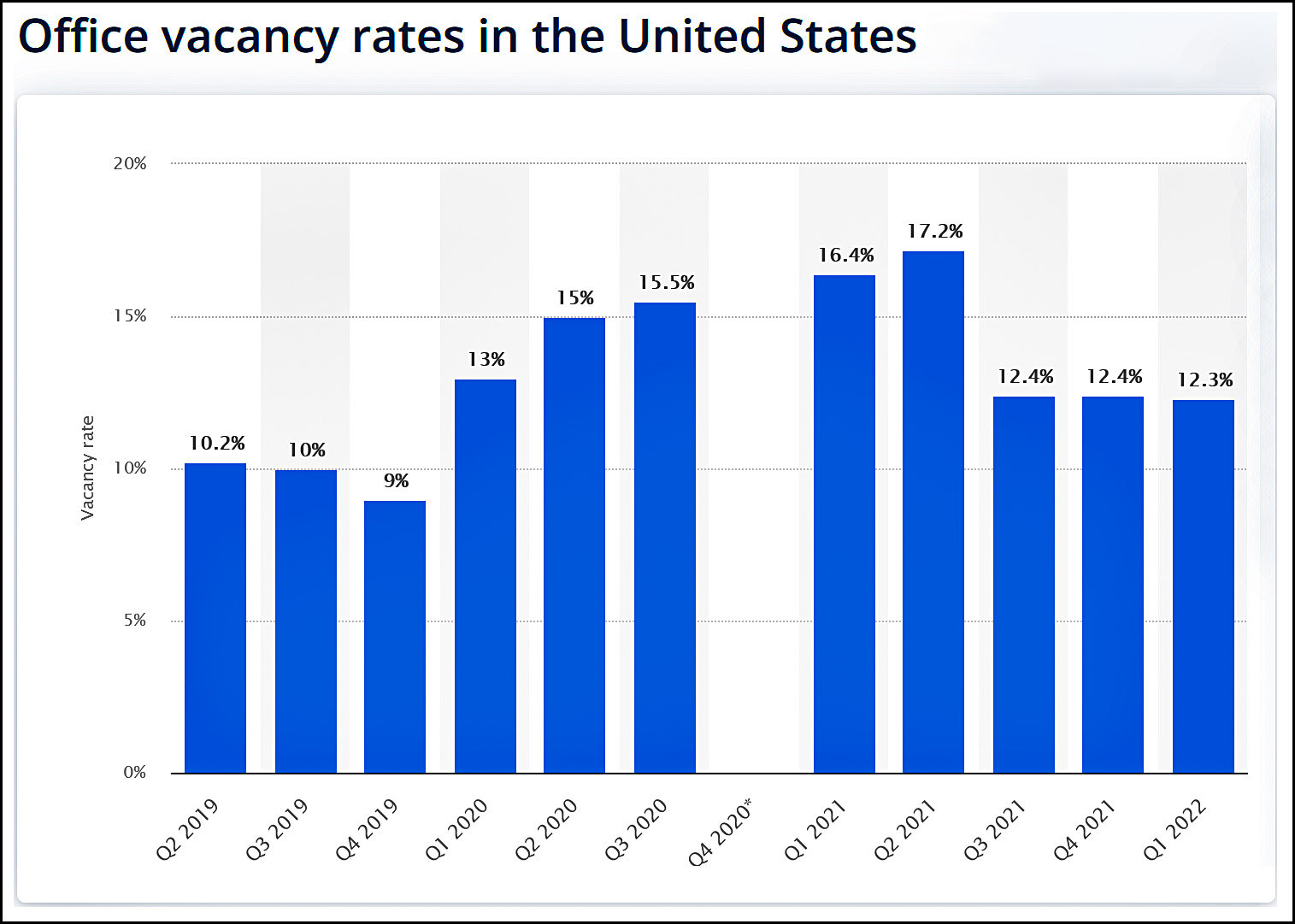 This might surprise you, but vacancy rates change slowly thanks to long-term lease agreements. Still, vacancy rates have recently come back down to nearly their rate before the pandemic. This wouldn't happen unless corporations have been actively re-signing leases in anticipation of getting their workforce back to the office fairly soon.
This might surprise you, but vacancy rates change slowly thanks to long-term lease agreements. Still, vacancy rates have recently come back down to nearly their rate before the pandemic. This wouldn't happen unless corporations have been actively re-signing leases in anticipation of getting their workforce back to the office fairly soon.
But this is just official vacancy rates. How much of this office space is actually being used? Here's an estimate from Moody's:
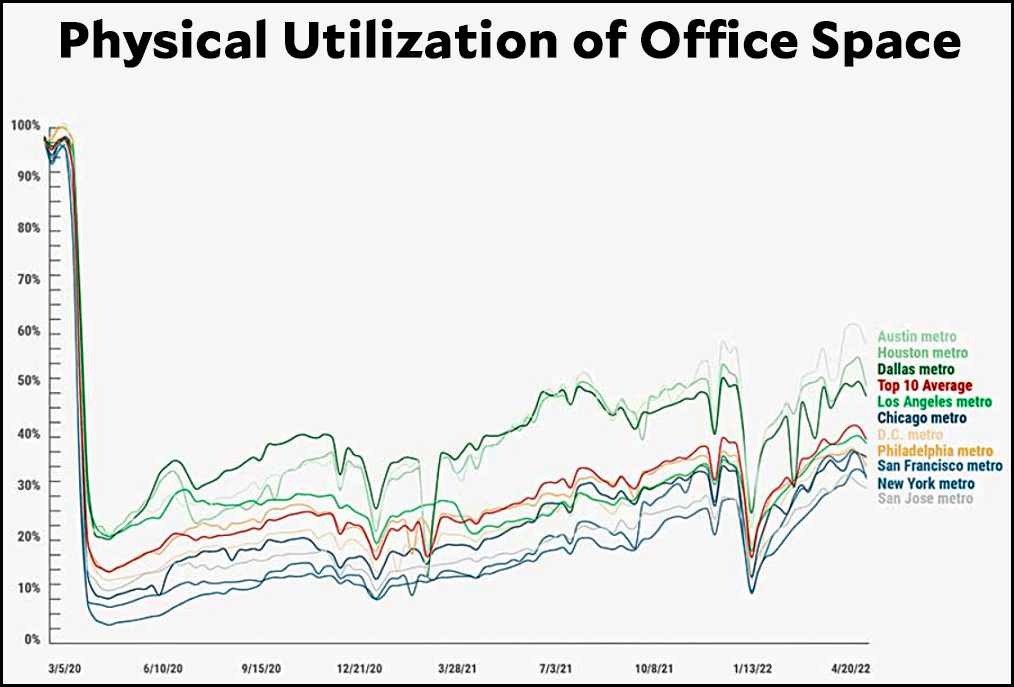 According to Moody's, the actual number of people using their offices plummeted from 95% pre-pandemic to around 15% after the pandemic hit. It has since risen to about 40%. This is progress, obviously, but still nowhere near 95%.
According to Moody's, the actual number of people using their offices plummeted from 95% pre-pandemic to around 15% after the pandemic hit. It has since risen to about 40%. This is progress, obviously, but still nowhere near 95%.
Finally, here are two charts with some interesting tidbits. First up is this survey from a recent Microsoft report on hybrid work:
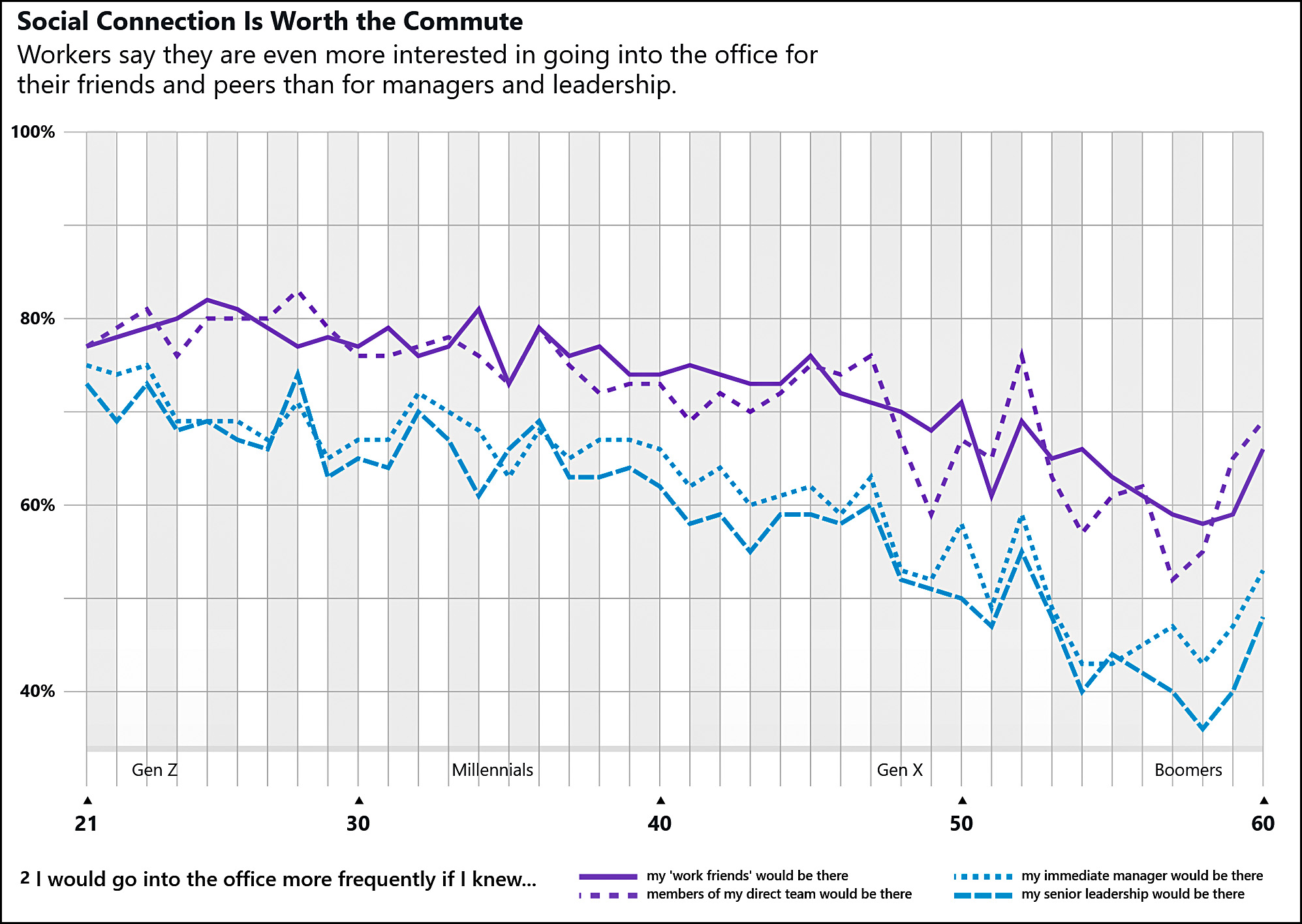 It's not surprising that people are more likely to come into the office if they think their friends will be there. But what is (a little) surprising is that this motivation for office work is by far the strongest among young workers. Contrary to popular myth, young people are generally hard workers but they're also, by far, the ones who say they want to work remotely. Perhaps, though, this is really only true if they dislike their office and don't have many friends there?
It's not surprising that people are more likely to come into the office if they think their friends will be there. But what is (a little) surprising is that this motivation for office work is by far the strongest among young workers. Contrary to popular myth, young people are generally hard workers but they're also, by far, the ones who say they want to work remotely. Perhaps, though, this is really only true if they dislike their office and don't have many friends there?
Finally, here's an excerpt from a chart in a recent McKinsey report:
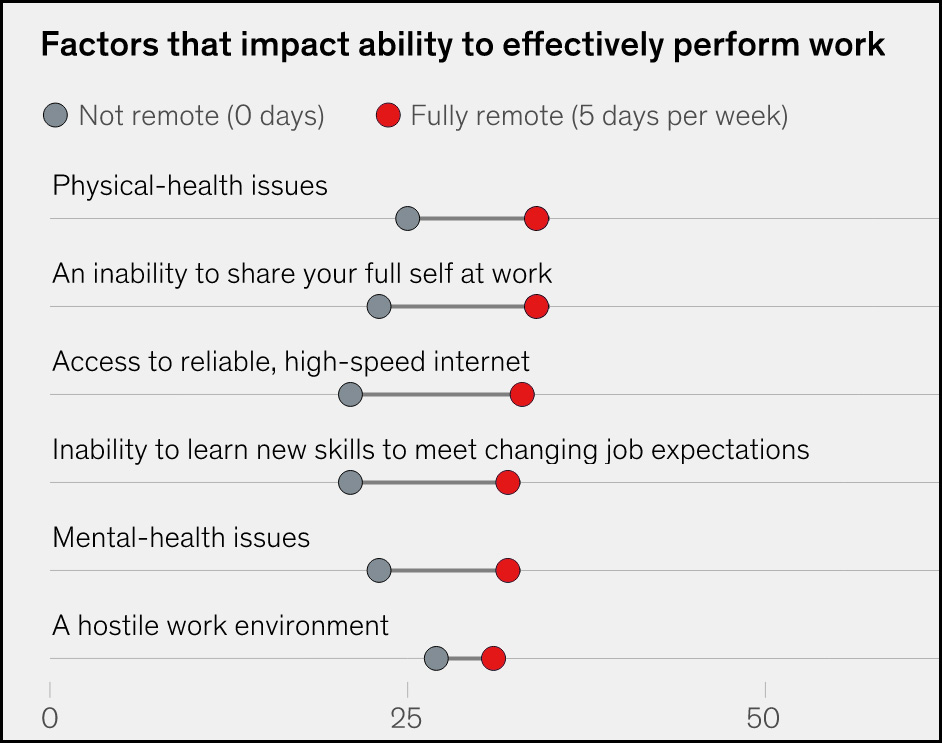 This is interesting because every single issue McKinsey polled produced more negative problems for remote work than in-person work. Some of these are odd: for example, why would physical health issues be worse for those working from home? Ditto for a hostile work environment, unless you're stuck in a really bad marriage.
This is interesting because every single issue McKinsey polled produced more negative problems for remote work than in-person work. Some of these are odd: for example, why would physical health issues be worse for those working from home? Ditto for a hostile work environment, unless you're stuck in a really bad marriage.
Regardless, what this shows is that, on average, a lot of workers understand already that there's a price to remote work. It's possible that this understanding will spread as remote work wears on. It's not the panacea that many people think it is.
As I said at the top, it's still too early to draw any firm conclusions from any of this. I continue to think that once things have shaken out, remote work will be more widespread than it was before the pandemic, but still has a ways to fall from today's numbers. I'd put my guess at 8-10% of the workforce.

My employer is in a weird place. We went full-remote and moved to an office that supports ~1/6th the local employees, in a shitty location. Now they want people to use it, so they're "requesting" people come in once a week + for big meetings where they want props to look attentive while the C-suite talks at them.
Meanwhile, we hired people all over the place - there is literally nobody I work with closely who is local. I'm more productive at home where I have my own office than I am there, because the office transitioned to "hotel desks" in a cube farm, so to verbally talk to anyone I have to find an unattended phone-booth-thing or meeting room to use. Not to mention I have a workspace that works for me instead of the cleaning crew, and I'm three years in to growing accustomed to the freedom to shout expletives at my computer.
But execs love the feelings of importance, and apparently nothing satisfies quite like a cube farm of worker bees. So until I get out of this place, I get to waste two hours a day going somewhere I'm less productive to be a prop.
Yay, capitalism.
I have mixed feelings on this. I worked remotely for about 30 years before retirement. As I traveled extensively on my job this worked well. However, there are a lot of downsides to remote work.
If you will do this you really need to invest in it. You need a separate room with a good desk, chair, lighting, ventilation, etc. You can’t use the dining room table.
Being out of the office you miss out on all sorts of human contact. Out of sight, out of mind applies to you. Remote workers are late to learn about changes in the office. Remote workers will likely be an afterthought when it comes to plum assignments and promotions.
You are less likely to have a good human relationship with your manager or coworkers which is what you need when it comes time to ask for a favor.
My office went from full remote, to one day a week, to two days a week over the course of the year. They announced they were moving up to three days a week in Jan. 2023, but received so many quit threats on an anonymous survey that they backed off for my work group, at least.
I think hybrid is here to stay for a lot of sectors, and it's going to be hard to measure that exactly as people bounce in and out on different schedules or at different times of year, or get reductions in office time due to life events or contract bargaining. Because my workplace is "open concept" I find it extremely difficult to concentrate with people having banal conversations about food and TV shows all g-ddamn day, and would be happy never to set foot in the place. Moving from two to three days a week would have significantly affected my quality of life. I imagine at some point they'll pull that lever when they're feeling more confident about their position over the labor.
The graph from Moody’s showing 40% of workers are in the office sure seems like an outlier among these sources.
Anecdotally, I regularly drive by 5 empty office buildings on one street in San Mateo (essentially Silicon Valley). They have tech company signage still out front, and had full parking lots 3 years ago.
Among the software people I know, about 1/3 of their companies have gone fully remote, abandoning their leases and hiring from all over the US, occasionally getting co-working spaces. Another 1/3 have smaller rump offices for meetings and on-sites. The other 1/3 are at various stages of progress towards getting everyone back into the office. Mostly failing at this goal.
I'm a computer programmer, and in the industry communities where I hang out it's often acknowledged that junior workers often have trouble learning in a remote environment. Senior devs tend to have more skills and be more sure of themselves and how to learn, so they don't need that face to face time.
So I guess my point is, maybe what the younger workers want more is to access peers? People they can learn from, build a network with, to start to make a career.
Just a guess
You ask "why would physical health issues be worse for those working from home."
As someone working from home since the pandemic started (I would prefer hybrid). there are two factors I have seen. 1) When you work at home, you rarely move your body --- you just sit at your desk. Office workers move coming and going to the office and in interacting with coworkers. 2) The only time you DO stand up is to go to the kitchen is to snack.
“…interesting because every single issue McKinsey polled produced more negative problems for remote work than in-person work. … why would physical health issues be worse for those working from home? … Ditto for a hostile work environment”…
My take on that was the study was poorly designed, and gets the causation backwards. The *types of people* most likely to complain of a hostile work environment, or of health problems interfering with their work, are also largely the *types of people* most inclined to work from home.
Not that working from home is causing these problems.
But I also agree with MrTango above, my observed experience is WFH means getting up from the desk less often, longer periods in one position, less ergonomically-designed work spaces, more repetitive-movement pains, and most people are gaining weight.
I think this is right. Given that it's a McKinsey report we can assume it was deigned with an outcome in mind.
There is no exercise at the office.
Designed, not deigned.
Also, Kevin excluded the data points for hybrid workers which 'show' that hybrid workers have significantly more negative factors than fully remote workers.
This doesn't make any sense. But it's a great data point for executives looking to bring people back to the office and limit even the hybrid setups.
Wouldn't it make sense that those with physical or mental barriers to employment had increased opportunities for employment via remote work, or am I misinterpreting the McKinsey data?
My workplace distinguishes among remote workers (those who are working more than 150 miles from the main location), telecommuting either full or part-time ("hybrid") or full-time on-site. Before the pandemic, very few people worked off-site except for an occasional day here or there (or travel to a meeting or conference). We weren't really set up for it and only workers with really good reasons to work off-site did so. When the pandemic shut everything down, we had to scramble to put in new procedures so that people could take computers and other office equipment home. Along the way, we put in new procedures for work modes as well. Remote work is still uncommon-there are complications having to do with taxes (if out-of-state) and export control (if out of the U.S.), but many people are choosing a hybrid schedule. Our workplace encourages this, because, among other reasons, it solves the perennial parking and space problems. My impression is that few people are choosing a 100% telecommuting option, and those who do so are indeed those who have health problems and are concerned about exposure to Covid and other viruses.
While having interactions with colleagues is a reason people here often give for working a hybrid or full-time on-site schedule, we're in a weird place right now, with many meetings still being conducted over zoom. I work a hybrid schedule, but I wonder sometimes why it's worth the gas and commuting hassle, just to sit in my office and stare at a screen all day (I can very well do that at home). For my workplace, however, there's no turning back to the pre-pandemic days where nearly everyone was expected to be on-site; we'll be offering the various work modes to employees whose jobs don't require them to be on-site full-time for the foreseeable future.
I've been working remote for five years, and remote work can be much most hostile than in-person, because people are a lot more likely to be cruel to someone they've never met in person. I've seen people go absolutely feral the last couple years.
Eventually, people will need to return to in-person workplaces. Team-building is hard to do remotely and institutional knowledge and practices are difficult to teach remotely, after all. But first, there are two challenges: (1) Uncertainty over the direction of SARS-CoV-2, which might have greater clarity after this winter wave; (2) Uncertainty over the economy with everyone predicting a recession.
My guess is that while people will return to the office, teams will only work in alternating periods. For instance, an office may be halved with each half working in-office every other week. One might cut out about one-third of their space needs while creating a siloed effect on office viruses.
If a job can be done 100% remote it should be remote 100%. It's asinine to require that an employee commute to an office to hotel for nebulous reasons. I adore working from home, not on my dinning room table as I once did -- once I had an agreement in place for Friday Telework back in 2017, I purchased an inexpensive sturdy desk but splurged on nicer chair as I have back issues -- I set up in the extra bedroom of my modest 1960s split level house.
I'm actually having more contact with my team than the before times as we purposefully now have daily quick skype meetings to keep everyone aware. Yeah less time wasting stuff where the time waster employees attempt to suck your time. OTOH I'm making the effort to be available and in contact with the newbies I'm tasked with training, I'm setting a tone where I want them to be comfortable poking me for "stupid questions".
I think a lot of folks are working under assumptions that every office is exactly like their own situation. My current team doesn't need to be on site so we're not but oh maybe 3 jobs ago before the true paperless office, yeah we needed to be on site for some stuff.
I think eventually the cost savings will outweigh the old fossil notions that people have to be in person to be properly managed. If you are not making physical things you don't need to be in person.
In-person management is about control/power over people, not management of work. So yeah.
I get one day a week. My employee just issued laptops, which we have to use (no remote access from PC), and it sucks. I will literally be working at my kitchen table because it's really the only place I can use the laptop.
The laptop has 2 ports, so I can't plug in to it and a monitor. The Surface dock is $200 and they gave us no cables to use at home. So, the only way I can plug in at home is to take all of my cables and the dock, from work, plus my mouse and keyboard, or rewire everything when I try to work at home. Even then, that will be a mess because I'll forget / lose things.
I think what ticks me off even more is during Covid I invested in my home work environment specifically to work at home.
This IT Director is an unmitigated ahole who just arbitrarily decides things like this then does a, too bad, when you don't like it. I wonder if he bought himself cables while he was rolling in late and leaving early.
Well, I guess no more working at home during emergencies and off hours either.
My experience at home vs the office. My business is market related. Tons of down time where you need to be aware but aren’t necessarily doing anything. So you must pass the time doing something. Usually reading or commenting here. At the office, it’s banter and boredom. At home I can- play my guitar’s , work out in my office or read. I just have to listen and drop anything ancillary when I need to. It doesn’t matter what I’m doing just that I have the flexibility and awareness. It worked great for me ( especially no longer commuting and gaining about 3 hours a day). Having ADD it was a home run being at home. Being back at the Local office sucks- mostly because I have an asshole co-worker I must see live every day.
I retired earlier this year, but prior to that, the last time I commuted to an office was May 1997. I've worked fully remotely since then, and it has been perfect for me. Granted, my need for live interaction with other human beings is easily satisfied by a daily trip to the local coffee shop, plus the supermarket once or twice a week.
I couldn't keep reading after the bit about McKinsey (the capitalist's consultant!) being negative about remote work being "odd." This post is full of so much low-level bullshit that I'm just not sure I can even engage. FFS.
Nevermind the plug about returning to the office being "progress", as if it's the platonic ideal!
McKinsey reports should set off alarm bells.
Hybrid schedules are bullshit. Worst of all possible worlds: you still have to pay all the time and monetary costs of commuting, but you still end up doing everything on Teams/Zoom anyway because invariably someone in the meeting isn’t in the office that day. Every day I go into my office on my hybrid schedule, I see no more than 3 people that I know face to face, and often I see zero. Wtf is the value of that? Either go fully remote or fully in person, but hybrid schedules suck.
My cousin could truly receive money in their spare time on their laptop. their best friend had been doing this 4 only about 12 months and by now cleared the debt. in their mini mansion and bought a great Car.
That is what we do.. https://profitguru9.blogspot.com/
"Tell Mike it was only business. I always liked him." I don't know why this is, but here in these great United States, the default behaviour of business seems to be to offload costs on their employees. Parking spaces, for example, where if you're in a remote lot your catalytic converter is as likely as not to be stolen within a year. And when you try to invoice, you get the usual passive voice 'mistakes were made'. OTOH, try to work remotely and you get reviews about, say, your personal appearance, the subtext being the costs are all on you to upgrade from the dining room table.
My cousin could truly receive money in their spare time on their laptop. their best friend had been doing this 4 only about 12 months and by now cleared the debt. in their mini mansion and bougght a great Car.
That is what we do.... https://rb.gy/n0gsld